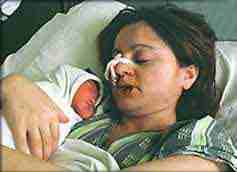|
Blog Feeds
The SakerA bird's eye view of the vineyard
Public InquiryInterested in maladministration. Estd. 2005
Human Rights in IrelandPromoting Human Rights in Ireland
Lockdown Skeptics
|
Mothers Day Revisited international |
anti-war / imperialism |
feature international |
anti-war / imperialism |
feature
 Saturday May 13, 2006 13:53 Saturday May 13, 2006 13:53 by Magdalena from Dun Laoghaire by Magdalena from Dun Laoghaire
 Mothers Day is a call for women to resist war

A mother with a newborn baby in a Belgrade hospital
This year -- as more and more mothers, in America, Britain, Italy, Spain, Poland as well as Iraq, mourn their fallen sons and daughters, lost to the insanity of organized violence -- Julia Ward Howe's call for women to not allow their men to constantly play at war is back in fashion, part of a growing awareness of the link between patriarchy and war. Mother's Day weekend is coming – there are anti-capitalist meetings, anti-war meetings and pro-Palestinian demonstrations organised in Dublin this weekend. I thought, however, it would be useful to reprint the 1870 call by American poet and women's leader Julia Ward Howe for the establishment of Mothers Day as a holiday. Particularly as, awareness by even anti-war and left activists is nearly nil that what is now widely viewed as a ‘sentimental tribute to family’ was originally a call for women to wage a general strike to end war. This year — as more and more mothers, in America, Britain, Italy, Spain, Poland as well as Iraq, mourn their fallen sons and daughters, lost to the insanity of organized violence — Julia Ward Howe's call for women to not allow their men to constantly play at war is back in fashion, part of a growing awareness of the link between patriarchy and war. Howe's original Mother's Day Proclamation should be the basis for parades, remembrances and other events that try to reclaim the holiday's original spirit in a year when the United States government talks seriously not of avoiding war, but of staying the course on the ones they're already fighting, and, heck, maybe even nuking Iran for good measure. The radical origins of Mother's Day — as a powerful feminist call against war, penned in the wake of the U.S. Civil War in 1870 — are fully compatible with the universal notion of honouring mothers. Women, even more so now, are the primary sufferers of warfare. In the 20th century, civilian populations bore 90 percent of war's casualties around the world. Mass and indiscriminate attacks, popularised in WWII by the Holocaust, Hiroshima and Nagasaki, the Allied firebombings in Japan and Germany, and the rape of Nanjing, are only the most spectacular examples of a phenomenon in which women become the bombed, the raped and the famine victims, the refugees, the forgotten statistics in what are invariably the wars of men. In Iraq, the violence of warfare has also been accompanied by a significant rollback in women's rights under the fundamentalist religious parties that now rule the country. In Afghanistan, the transition from the Taliban to a U.S.-backed thugocracy has done virtually nothing to alleviate the fundamentalist repression of women. In the so-called War on Terror, so far, it is primarily women who have been terrorized. Now, as has been the case throughout history, the suffering of men in war is glorified, and the suffering of women ignored. Howe knew this 136 years ago. Even then, the generals had written our historical memory, in the Civil War and in most popular narratives of the bloody trail of modernizing "Western Civilization." It's worth remembering that the Civil War, the culmination of a political division that lasted longer and was considered more intractable than today's Palestine/Israel conflict or indefinite "War on Terror," and that killed well over 100 times more people on American soil than the attacks of Sept. 11, was not unanimously lauded at the time. And that women thought they could do something to prevent such bloodshed in the future. Here is the original, pre-Hallmark, Mother's Day Proclamation, penned in Boston by Julia Ward Howe in 1870: Arise, then, women of this day! Maybe next year The public domain image used in the process of featurising this article was taken from the Wikipedia commons. |




![[Dublin] National Demonstration: Freedom for Palestine - End Gaza Genocide - Sanctions Now! nat_demo_palestine_feb17.jpg](../cache/imagecache/local/attachments/feb2024/72_54_1_1_5_0_0_0_0_0_nat_demo_palestine_feb17.jpg)

















 printable version
printable version

 Digg this
Digg this del.icio.us
del.icio.us Furl
Furl Reddit
Reddit Technorati
Technorati Facebook
Facebook Gab
Gab Twitter
Twitter
View Full Comment Text
save preference
Comments (8 of 8)